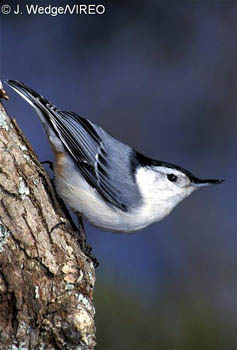Loading ...
White-breasted Nuthatch
The White-breasted Nuthatch (Pipilo erythrophthalmus), resides in deciduous and mixed forests across America. They walk head-first down tree trunks and large branches searching crevices for food. They make themselves conspicuous with a variety of low-pitched nasal calls. In winter White-breasted Nuthatches typically flock with chickadees, downy woodpeckers, tufted titmice and other small birds.
See all White-breasted Nuthatch photosField Marks:
The White-breasted Nuthatch has a black crown and nape (both gray in the female), bright white face and breast, bluish-gray back, rusty under-tail feathers, and prominent, slightly upturned bill. (L. 5.75)
Distribution:
The White-breasted Nuthatch is a permanent resident in southern Canada, most of the U.S., and central Mexico south to Oaxaca. It is absent from most of the Gulf Coast, Florida south of the panhandle, and a swath through Texas extending north into the Great Plains.
Similar Species:
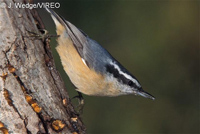 |
Red-breasted Nuthatch (species account) (all photos) The Red-breasted Nuthatch has a rufous breast, prominent white stripe over the eye and black eye-line. |
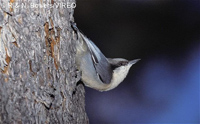 |
Pygmy Nuthatch (all photos) The Pygmy Nuthatch in the western U.S. has a brownish head. |
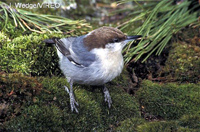 |
Brown-headed Nuthatch (all photos) The Brown-headed Nuthatch in the southeastern U.S has a brownish head. |
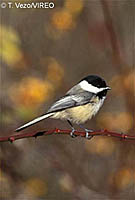 |
Black-capped Chickadee (species account) (all photos) The Black-capped Chickadee has a black throat as well as a black cap and a very small bill. |
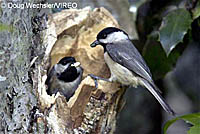 |
Carolina Chickadee (species account) (all photos) The Carolina Chickadee has a black throat as well as a black cap and a very small bill. |
Habitat & Nesting:
The White-breasted Nuthatch nests in tree cavities and old woodpecker holes, primarily in deciduous forest.
More Information:
The White-breasted Nuthatch (especially the female of the species) frenetically collects and caches seeds in tree crevices. In warm months the nuthatch is helpful in controlling outbreaks of gypsy moths and tent caterpillars. The strong bond between male and female nuthatches lasts throughout the year.

